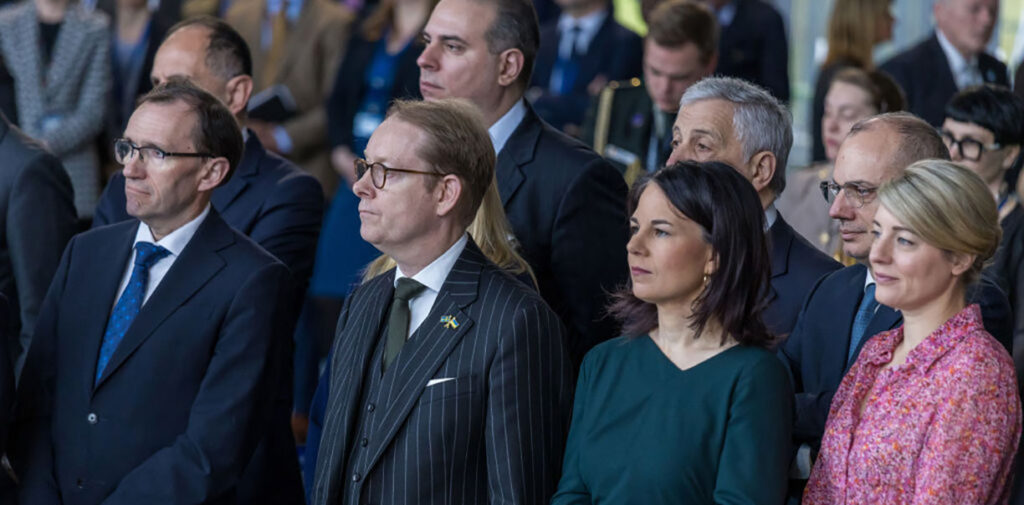Canadian Foreign Minister Melanie Joly, far right, listens to remarks at NATO’s 75th Anniversary celebration in April 2024. Espen Barth Eide, Minister of Foreign Affairs of Norway, left, and Swedish Foreign Minister Tobias Billström, center left, met with Joly and other Nordic defense ministers in September 2024 to discuss strengthening security ties in the Arctic. AFP/GETTY IMAGES
THE WATCH STAFF
Canada has launched a diplomatic and security initiative with its Nordic partners, focusing on strengthening the alliance of Arctic NATO members and countering an uptick in “dual-use” technology in the Arctic by Russia and the People’s Republic of China (PRC). Canadian Minister of Foreign Affairs Mélanie Joly met with Nordic defense ministers in late September 2024 in Iqaluit, the capital of Canada’s northern territory of Nunavut. The ministers representing Denmark, Finland, Iceland, Norway and Sweden pledged to create an Arctic security dialogue to discuss defense and other matters. The forum offers an official space for conversations on foreign investment in the Arctic. It also will monitor PRC and Russian dual-use technology, which can be used for military and civilian objectives, Joly said. “For a long time in Canada, we thought we were protected by our geography. But now we need to reckon that we are a country facing Russia and because of climate change, more countries are interested in the Arctic, including China,” she said in an interview with Bloomberg News. “We need to be addressing this new reality.”
Following the cessation of Arctic Council cooperation after the Russian invasion of Ukraine in 2022, Nordic and Canadian leaders decided they needed to meet as a body to discuss security matters and Arctic development, Joly said. Russian-sponsored actors have been identified by Scandinavian countries as the likely sources of a string of sabotage attacks in the last few years, including the cutting of undersea communication cables and other infrastructure near military bases. Since the war in Ukraine began, Finland and Sweden have joined NATO, and nearly all Nordic countries and Canada have boosted their defenses in response to more frequent Russian activity in the Far North and an increasing presence of the PRC in the region.
Joly, foreign minister since 2021, has led Canada’s response to the Russian invasion of Ukraine and unveiled an Indo-Pacific strategy aimed at curbing the PRC’s influence. A major component of that strategy was increasing military assets and intelligence-gathering, highlighted in Canada’s new defense plan, Our North, Strong and Free, that calls for the acquisition of under-the-ice submarines, long-range Arctic patrol vessels and helicopters, and sensors and radar stations to improve monitoring in its Arctic territories. Canada has also pledged to invest in Indigenous communities and rely on local knowledge and skills in the harsh environment. This initiative was a factor in the selection of Iqaluit to kick off the new forum.
Canada has also promised to meet NATO’s spending threshold of 2% of gross domestic product (GDP) by 2032. Denmark, Finland, Norway and Sweden already spend at or above the threshold, Bloomberg reported. The pledge to deepen security talks with democratic allies in the North is “very positive and very overdue,” Heather Exner-Pirot, a special advisor at the Business Council of Canada with expertise on Arctic development and security, told Bloomberg. She noted that senior Chinese and Russian officials have been meeting to discuss Arctic strategy.
Joly hosted a working dinner with her counterparts from the Nordic states on September 27, 2024, on the sidelines of the United Nations General Assembly in New York. The next day, Joly traveled to Iqaluit with the Nordic defense ministers along with representatives from the Faroe Islands and Greenland. They met with Nunavut Premier P.J. Akeeagok and members of his Cabinet to discuss the implications of the changing Arctic security situation, how it impacts Canada’s Indigenous communities and future paths for collaboration to achieve a prosperous and stable region, according to a Canadian government news release.
The ministers also met with the 1st Canadian Ranger Patrol Group at the Unikkaarvik Visitor Centre. The rangers told the group about their “lived experiences as northerners,” according to the Nunatsiaq News, a Canadian newspaper.
Canada’s diplomatic initiative will yield dividends for every nation interested in maintaining the international rules-based order. “In a rapidly changing Arctic marked by new challenges and increased strategic competition, deeper collaboration with like-minded Arctic states is needed,” the Canadian release stated.

